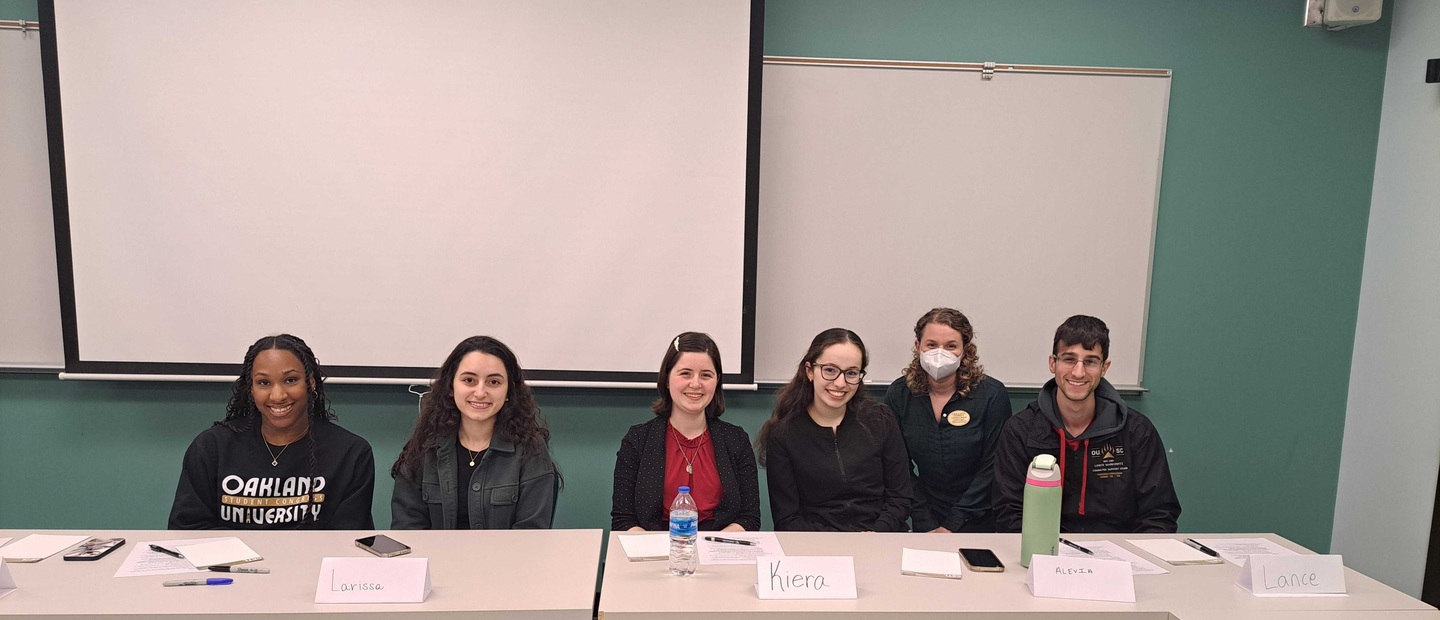
Student Perspectives on Navigating Difficult Discussions
In an ongoing student engagement collaboration with OU Student Congress’ Lance Markowitz, we hosted the third annual student panel, this year’s theme being “navigating the tough topics.” As an extension of this event, we invited those involved in the panel to share their takeaways, key ideas, and hopes for the future as far as facilitating intentional, meaningful discussion on topics that matter. Watch the panel event recording, and tune in to future efforts on cultivating student-faculty collaborations in teaching and learning.
Building Rapport Before Facilitating Discussions
Lance Markowitz, Senior, Spanish and General Management Major, Student Congress CETL Liaison, Panel Co-moderator
The student panel helps kickstart communication between faculty and students, but the ultimate goal of this event is to facilitate ongoing dialogue. Students will share their input when they feel comfortable, and one way to increase comfortability is through rapport-building. Building rapport increases student buy-in and helps lead to more meaningful learning. While building rapport may seem daunting, there are so many simple strategies that show students you care. Introducing yourself and discussing your personal and professional background help students put a story to a face. Additionally, learning students’ names and asking for their feedback are small gestures that show us you care. Even just encouraging respectful disagreements during classroom conversations helps bring normality to discussing grey issues. Thank you to all who were able to attend this year's panel and please don’t hesitate to reach out so we continue these conversations ([email protected]).
Keeping an Open Mind
Larissa Giacomin, Junior International Relations Major and French Minor, Treasurer of OU Model UN Team and Secretary of Pi Sigma Alpha
People’s perceptions of what difficult conversations are and how they should go can vary, but cutting people off right off the bat is not the way to go. Keeping an open mind to what people have to say may teach us something valuable. So, allowing at least the initial stages of difficult conversations can host a friendly and safe environment for students to grow and learn. That being said, it is crucial that professors are skilled to navigate and direct such conversations. Professors framing issues as questions or debates while remaining impartial is just as important as students listening attentively and remaining respectful while sharing their opinion. Human interaction is never one-sided, and it is everyone’s job to make sure that those around us feel respected and included when engaging in difficult conversations.
Strategies Across a Skill Spectrum
Christina Moore, CETL Associate Director, Panel Co-moderator
The student-led panel planning committee intentionally selected diverse student panelists based on their majors, identities, perspectives, and other factors, which resulted in different opinions on the questions presented. Some preferred faculty avoid controversial topics while others saw them as integral to authentic learning. Some felt conversations dragged on too long while others felt cut-off and silenced. The panelists provided essential context for their experiences such as family history, educational expectations, and whether they were often the only or few of a particular identity or viewpoint.
Controversial topics and difficult discussions can’t always be avoided
Student may bring them up; a problematic comment may come up in discussion or in a class text; or a current event may require addressing the topic. In these moments, it’s good to know what your level of preparedness is, and respond in a way that acknowledges students even if you aren’t ready to have a whole class discussion. (e.g., "I want to make sure this discussion gets the attention it deserves. Let's talk more at office hours, or we can find another time.")
Anticipate and plan
What controversial events relate to your course or are likely to affect your students? What level of response is appropriate? How can you make students feel heard even if you’re not adept at facilitating potentially heated conversations?
During last year’s discussion on Teaching through Tragedy and Conflict, Dr. David Schwartz said sometimes it’s appropriate to simply acknowledge how people may be feeling about an incident, what relevant support is available on campus, and continue with class accordingly.
If you want students to practice discussion difficult conversations, set specific parameters and ground rules, whether that is an amount of time for the conversation, how to focus on generative outcomes. Our blog post Managing Difficult Moments provides concrete actions to build these discussion skills.
You can also always meet with us to talk through a scenario or plan, or reach out to the Dean of Students, Counseling Center, or other experts on campus depending on the nature of the discussion or potential conflict.
Save and adapt a Google Doc version of this teaching tip.
Others may share and adapt under Creative Commons License CC BY-NC. View all CETL Weekly Teaching Tips. Follow these and more on Facebook, Twitter, and LinkedIn.

